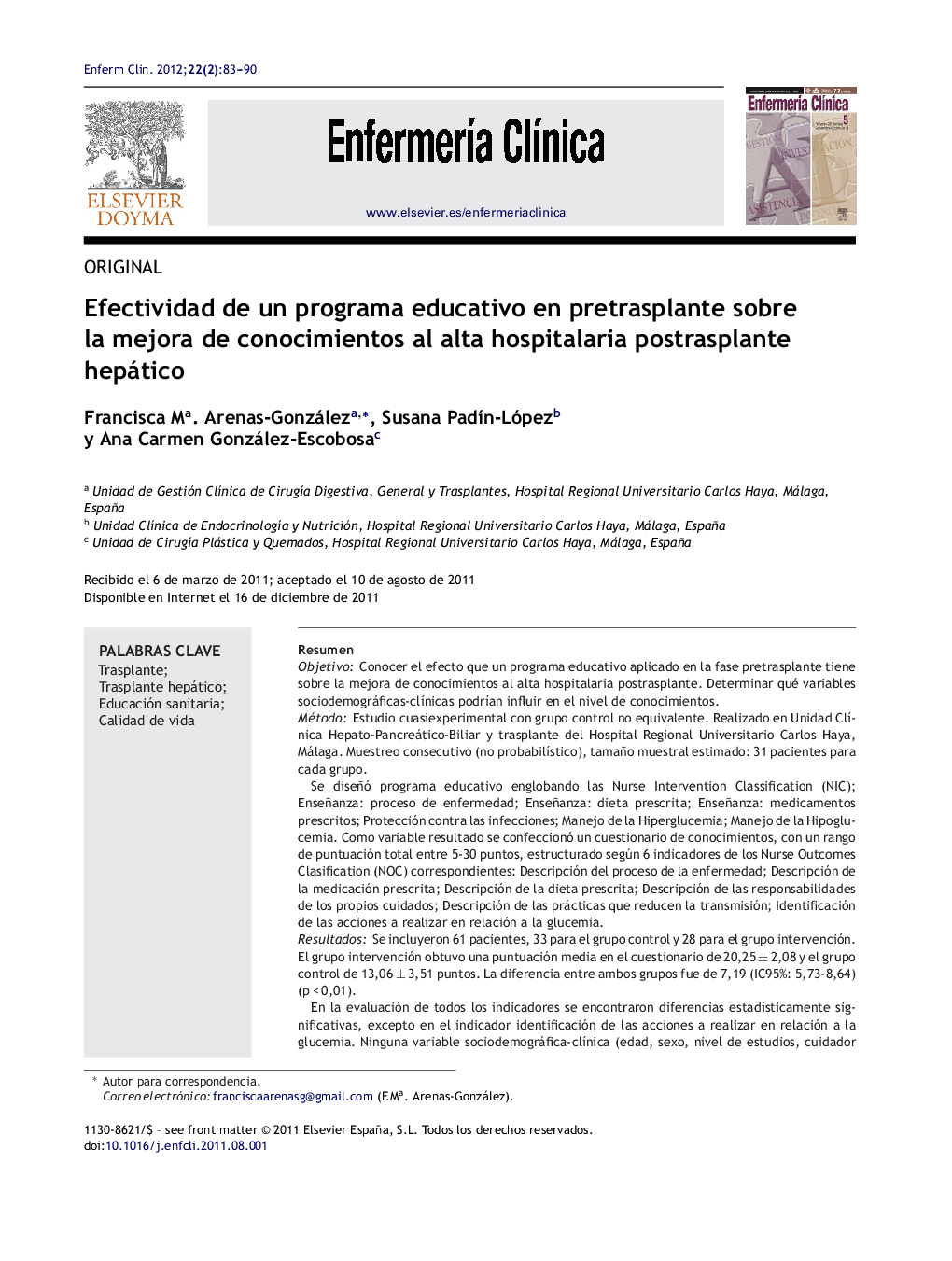| کد مقاله | کد نشریه | سال انتشار | مقاله انگلیسی | نسخه تمام متن |
|---|---|---|---|---|
| 2647086 | 1138992 | 2012 | 8 صفحه PDF | دانلود رایگان |

ResumenObjetivoConocer el efecto que un programa educativo aplicado en la fase pretrasplante tiene sobre la mejora de conocimientos al alta hospitalaria postrasplante. Determinar qué variables sociodemográficas-clínicas podrían influir en el nivel de conocimientos.MétodoEstudio cuasiexperimental con grupo control no equivalente. Realizado en Unidad Clínica Hepato-Pancreático-Biliar y trasplante del Hospital Regional Universitario Carlos Haya, Málaga. Muestreo consecutivo (no probabilístico), tamaño muestral estimado: 31 pacientes para cada grupo.Se diseñó programa educativo englobando las Nurse Intervention Classification (NIC); Enseñanza: proceso de enfermedad; Enseñanza: dieta prescrita; Enseñanza: medicamentos prescritos; Protección contra las infecciones; Manejo de la Hiperglucemia; Manejo de la Hipoglucemia. Como variable resultado se confeccionó un cuestionario de conocimientos, con un rango de puntuación total entre 5-30 puntos, estructurado según 6 indicadores de los Nurse Outcomes Clasification (NOC) correspondientes: Descripción del proceso de la enfermedad; Descripción de la medicación prescrita; Descripción de la dieta prescrita; Descripción de las responsabilidades de los propios cuidados; Descripción de las prácticas que reducen la transmisión; Identificación de las acciones a realizar en relación a la glucemia.ResultadosSe incluyeron 61 pacientes, 33 para el grupo control y 28 para el grupo intervención. El grupo intervención obtuvo una puntuación media en el cuestionario de 20,25 ± 2,08 y el grupo control de 13,06 ± 3,51 puntos. La diferencia entre ambos grupos fue de 7,19 (IC95%: 5,73-8,64) (p < 0,01).En la evaluación de todos los indicadores se encontraron diferencias estadísticamente significativas, excepto en el indicador identificación de las acciones a realizar en relación a la glucemia. Ninguna variable sociodemográfica-clínica (edad, sexo, nivel de estudios, cuidador principal, causa del trasplante, tiempo en lista de espera, en planta, estancia hospitalaria y días transcurridos desde la última charla hasta el trasplante solo en grupo intervención) se asoció significativamente al nivel de conocimientos.ConclusiónEl programa educativo realizado en el HRU Carlos Haya a pacientes en lista de espera para trasplante hepático (TH) mejoró los conocimientos de dichos pacientes tras TH.
ObjectiveTo determine the effect of an educational program implemented before liver transplant on improving understanding at hospital discharge after the transplant and examine the contribution of different demographic and clinical variables on the level of knowledge.MethodsA quasi-experimental study with a non-equivalent control group undertaken at the Hepato-Biliary-Pancreatic and Transplant Unit of Carlos Haya Regional University Hospital, Malaga, Spain. Sampling was consecutive (non-probabilistic), with a sample size of 31 patients for each group. An educational program was designed, encompassing the following Nurse Intervention Classification (NIC): Teaching: disease process; Teaching: prescribed diet; Education: prescription drugs; Protection against infection; Management of Hyperglycaemia; Management of Hypoglycaemia. For the outcome variable, a knowledge questionnaire was designed, with a total score range between 5-30 points, structured according to 6 indicators for Nurse Outcomes Classification (NOC): Description of the disease process, Description of the medication prescribed, Description of the prescribed diet, Description of self-care responsibilities, Description of practices that reduce transmission, Identification of actions to take in relation to blood glucose.ResultsThe study included 61 patients, 33 for the control group and 28 for the intervention group. The mean score on the questionnaire of the intervention group was 20.25 ± 2.8 and that of the control group 13.06 ± 3.51 points. The difference between the two groups was 7.19 (95% CI: 5.73-8.64; P<.01). The analysis of the indicators showed that there were significant differences between the study groups, except for the indicator identification of actions to take in relation to blood glucose. No demographic or clinical variable (sex, education level, primary caregiver, waiting list time, time in hospital unit, hospital stay and days since the last talk before the transplant (only in intervention group)) was significantly associated with level of knowledge.ConclusionThis educational program conducted at Carlos Haya hospital in patients on the liver transplant waiting list improved their knowledge after their transplant.
Journal: Enfermería Clínica - Volume 22, Issue 2, March–April 2012, Pages 83–90